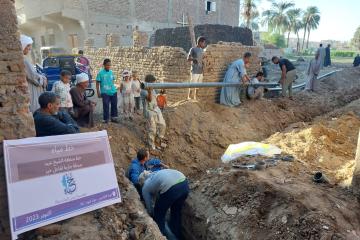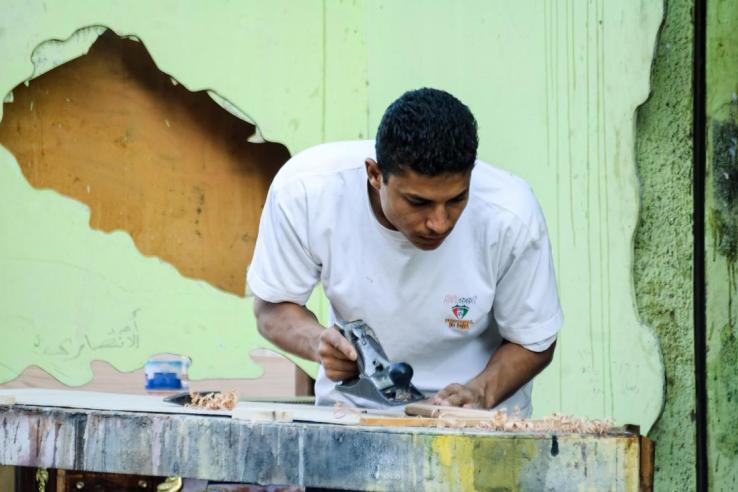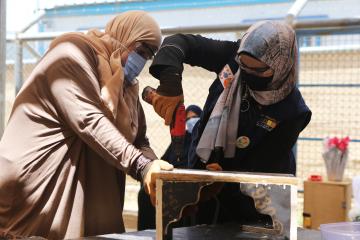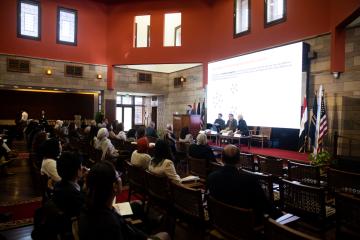
Building the foundation for robust vocational education RCTs in Egypt

Over two million students are enrolled in Egypt's technical and vocational education system. Most of them come from low-income backgrounds and seek better livelihoods through skills development and improved employment opportunities. These students are why we are working to make sure education policies are informed by rigorous evidence from programs and policies that have been tested worldwide. At J-PAL Middle East and North Africa (MENA), through its embedded government lab Egypt Impact Lab (EIL), we use partnerships as an important tool to influence education policy-making directly. We have found that multi-stakeholder and multi-layered partnerships have allowed us to incorporate the lessons learned from J-PAL evaluations globally into the policies being developed in Egypt.
Partnerships play a vital role in designing and running relevant, useful, and impactful randomized evaluations. By teaming up with government and local organizations, we gain essential cultural and contextual insights, ensuring our evaluations are tailored to the community’s unique needs. Partnerships also enable the EIL team to work out the administrative steps needed to transform discussions about randomized evaluations into action in schools. These administrative steps cover crucial logistics, from security clearances to intervention rollout coordination and facilitating the access of data collection enumerators in government schools. By engaging stakeholders early on, we can ensure that our evaluation addresses their needs and priorities and creates value for them, which promotes the take up of the evaluation findings into the decision-making process. Moreover, these collaborations build local research capacity and support the scalability of successful interventions, fostering a long-term commitment to evidence-based policy design.
Egypt's investment in technical and vocational education and training (TVET) is strategic, aiming to equip youth with the adaptable skills and knowledge necessary to thrive in the evolving global economy. As industries evolve, there's a growing need to align students’ skills with labor market demands. The Technical Education Reform Strategy (TE 2.0) addresses this by focusing on pillars like enhancing quality, updating curricula, optimizing human resources, engaging industries, and changing societal perceptions of technical education. This aims to improve program quality, prepare graduates for the workforce, and contribute to Egypt's social and economic development. The Ministry’s leadership has taken an “all hands on deck” strategy, seeking technical and financial support from many international and local organizations.
In light of this reform, J-PAL MENA recognized the importance of partnering with Egypt’s Ministry of Education and Technical Education (MoETE) to assist policymakers in making informed decisions based on scientific evidence. This partnership comes through J-PAL’s Egypt Impact Lab (EIL), which focuses on Egypt's development priorities by generating rigorous evidence, building government capacity, and strengthening local knowledge ecosystems. It demonstrates the benefits of continuous engagement and evidence-based strategies for sustainable educational improvements.
To fulfill this framework, strong, multi-layered partnerships are essential. Within the MoETE, we speak to senior leadership, middle management, teachers, principals and students. We collaborate closely with MoETE's senior leaders to identify their priorities, share evidence of what works in vocational and skills training programs from J-PAL’s evaluation database, and raise awareness about evidence-based decision-making. We engage middle management through the Leading for Evidence-Informed Decision Making (LEID) training program, a tailored capacity-building program for policymakers to equip them with relevant knowledge about evaluation, data, and evidence, making them champions of our initiatives. We rely on our LEID champions to understand the nuances and complexities of the MoETE’s operational activities on the ground and coordinate our field activities to collect data for evaluation. They are our guides and consultants for all field activities. We also prioritized field visits to schools. This offers valuable insights directly from students and teachers who experience the reforms differently.
Not only do we engage MoETE, but we also facilitate interactive workshops that bring together MoETE officials and key partners and donors of the reform, such as the USAID-funded “Workforce Egypt” project, European Training Foundation (ETF), and the German Development Corporation (GIZ). These workshops focus on enhancing understanding of evaluation and evidence, fostering knowledge exchange between all stakeholders, and aligning activities and timelines to develop robust evaluation designs that capture the complexities of educational reform and produce helpful, actionable recommendations throughout the evaluation.
We have found that adapting to partners' needs and tailoring our evidence to their specific contexts have been fundamental in building trust and fostering an evidence-based culture. Additionally, engaging all stakeholders and donors involved in the reform process has been crucial for achieving sustainable improvements, highlighting the importance of trust and cooperation. Furthermore, involving all levels within the Ministry's structure facilitates the process of developing robust evaluation designs and helps cultivate champions for our initiatives.
At J-PAL, we are dedicated to informing vocational and skills training programs with rigorous evidence through randomized evaluations. Globally we have conducted over 28 evaluations to explore the impact of training and skills-building programs on youth's skills attainment, employment (both formal and informal), earnings, and poverty reduction. Building these partnerships has been complex due to differing agendas and interests. Each partner brings unique action plans and budgets, and we navigate a hierarchy of accountabilities from the smallest organizations to the largest entities. Despite these challenges, our collaborative efforts ensure that policies are grounded in evidence and effectively serve the needs of youth.
J-PAL MENA and the EIL work to support governmental policy-making by harnessing the power of partnerships. While building and maintaining these diverse partnerships requires significant effort, they are essential for producing high quality evidence that will lead to meaningful change.
J-PAL MENA is open to collaborating with policymakers and NGOs interested in designing and evaluating innovative ways to improve barriers to participation in technical education and vocational training programs in the region. Reach out to Nayera Adly, Policy Manager at J-PAL MENA, and Arwa Adel, Policy Associate at J-PAL MENA, to learn more about our work and how we can collaborate.




